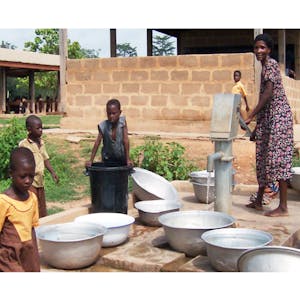Water Supply and Sanitation Policy in Developing Countries Part 2 Developing Effective Interventions
Water Supply and Sanitation Policy in Developing Countries Part 2 is our second MOOC in a two-part sequence, and looks at ‘Developing Effective Interventions’. Here we invite you to develop analytical skills and deep understanding about a complex, controversial policy problem – one with no simple, easy answers. About half a billion people on our planet still lack access to improved water supplies and about two billion do not have improved sanitation services, leading to an unknown but very large number of avoidable deaths each year from water-related diseases. Millions of dollars are spent on avoidable health care expenditures, and people – mostly women – spend many billions of hours carrying water from sources outside the home. Reducing these costs is a major global challenge for us all in the 21st century. Join us to explore the challenging and complex political, economic, social, and technical dimensions of the policy interventions that donors, national governments and water utilities use to address this challenge. This second MOOC consists of the following seven sessions:• Session 1: Introduction and how our ‘ancient instincts’ affect water policy interventions.
• Session 2: Planning better policy interventions: Roles, features and examples of planning protocols.
• Session 3: Water pricing, tariff design and subsidies.
• Session 4: Providing information to households and communities to improve water and sanitation conditions.
• Session 5: Changing the institutions that deliver water and sanitation services: Privatization in developing countries.
• Session 6: Changing institutions: Lessons from the UK water privatization story.
• Session 7: Changing institutions: Improving regulation of the water and sanitation sector.
Your instructors for this course have worked in and studied this sector for many years. Professor Dale Whittington has worked on water and sanitation policy and planning issues for over 40 years in more than two dozen low and middle-income countries. Dr Duncan Thomas has worked in the UK and European water sectors for 15 years, focusing on overcoming barriers to technological, organizational, regulatory and policy innovations.
Please watch this introductory video outlining the course: https://youtu.be/KkBmo3EKkkI
None
Syllabus
Syllabus - What you will learn from this course
Week 1
Introduction and how our ‘ancient instincts’ affect water policy intervention
Week 2
Planning better policy interventions: Roles, features and examples of planning protocols
Week 3
Roles, features and problems of water pricing, tariff design and subsidies
Week 4
Providing information to households and communities to improve water and sanitation conditions
Week 5
Changing the institutions that deliver water and sanitation services: Privatization in lesser developing countries
Week 6
Changing institutions: Lessons from the UK water privatization story
Week 7
Changing institutions: Improving regulation of the water and sanitation sector
FAQ
When will I have access to the lectures and assignments?
Access to lectures and assignments depends on your type of enrollment. If you take a course in audit mode, you will be able to see most course materials for free. To access graded assignments and to earn a Certificate, you will need to purchase the Certificate experience, during or after your audit. If you don't see the audit option:
What will I get if I purchase the Certificate?
When you purchase a Certificate you get access to all course materials, including graded assignments. Upon completing the course, your electronic Certificate will be added to your Accomplishments page - from there, you can print your Certificate or add it to your LinkedIn profile. If you only want to read and view the course content, you can audit the course for free.
Is financial aid available?
Yes. In select learning programs, you can apply for financial aid or a scholarship if you can’t afford the enrollment fee. If fin aid or scholarship is available for your learning program selection, you’ll find a link to apply on the description page.
Reviews
It has been a great course on Water Supply and Sanitation Policy in Developing Countries.
Very good course to understand the water problems in developing countries.
Excellent video presentation and interviews. Excellent reference articles. (Use the companion YouTube videos)
As a public health professional with keen interest in WASH, I found this course highly educative on the effective strategies for water and sanitation interventions in developing countries.
